Imagine beginning your day in the heart of rural Rwanda, where the rhythmic sounds of weaving fill the crisp morning air. A local artisan, skilled in the traditions of their culture, starts their day with purpose, arranging the vibrant materials that will soon transform into intricate baskets. As they meticulously weave each strand, they share the significance behind the patterns, inviting you to not just observe, but to truly understand the depth of their craft. This is more than a simple demonstration – it’s an opportunity to learn about the daily life of a true artisan, and uncover the stories that make each creation truly remarkable.
Key Points
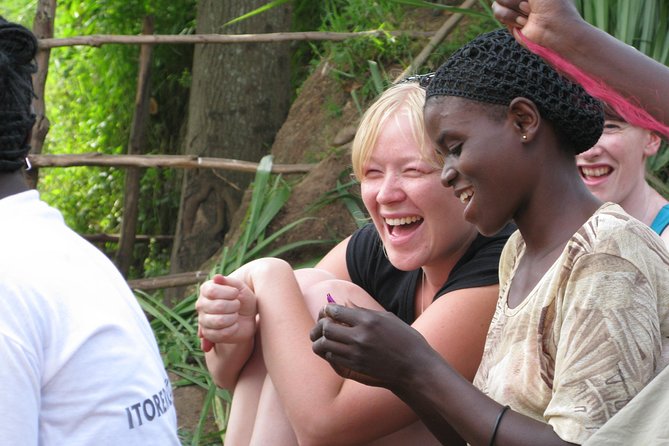
- Immersion in the daily rhythms and essential chores of a traditional Rwandan village, such as hoeing fields and planting crops.
- Participation in home-cooked Rwandan lunch with a host family, fostering cultural exchange and insights into daily lives.
- Engagement in lively discussions about farming practices, climate change challenges, and traditional artisanry’s role in preserving heritage.
- Hands-on weaving lesson led by a local artisan, providing an opportunity to learn intricate techniques behind Rwanda’s textile traditions.
- Visits to artisan’s workshop for browsing and purchasing unique handmade items, including woven baskets, wall hangings, and beaded jewelry.
Authentic Rural Experience
The opportunity to take in the daily rhythms of a traditional Rwandan village offers guests an authentic, hands-on rural experience.
Travelers can participate in essential chores like hoeing fields and planting crops, gaining a deeper understanding of the local way of life.
Enjoying a homemade Rwandan lunch with the host family allows for engaging conversations and cultural exchange.
The experience concludes with a weaving lesson, providing a chance to learn a traditional craft and purchase unique handmade souvenirs.
This small-group tour, limited to six guests, ensures an intimate and personalized interaction with the local community, leaving a lasting impression of Rwanda’s vibrant rural heritage.
You can also read our reviews of more tours and experiences in Kigali.
Participating in Daily Chores
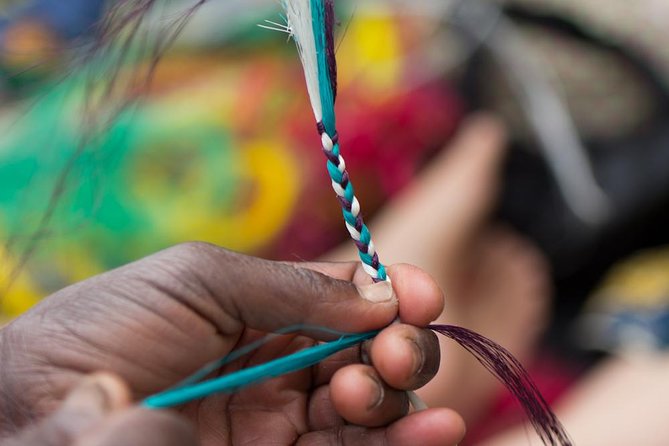
After witnessing the preparation of the traditional Rwandan lunch, guests don sturdy boots and gloves to lend a hand with the daily agricultural tasks. They’ll hoe the fields alongside the local family, learning the techniques used to cultivate the land and plant various crops.
This hands-on participation offers a unique glimpse into the self-sufficient lifestyle of the rural community.
The experience includes:
-
Hoeing the fields to prepare the soil for planting.
-
Assisting with the planting of crops such as cassava, sweet potatoes, and beans.
-
Learning about the importance of crop rotation and sustainable farming practices.
This immersive interaction with the local artisan’s daily chores provides a deeper understanding of the community’s resilience and connection to the land.
Lunch of Local Fare
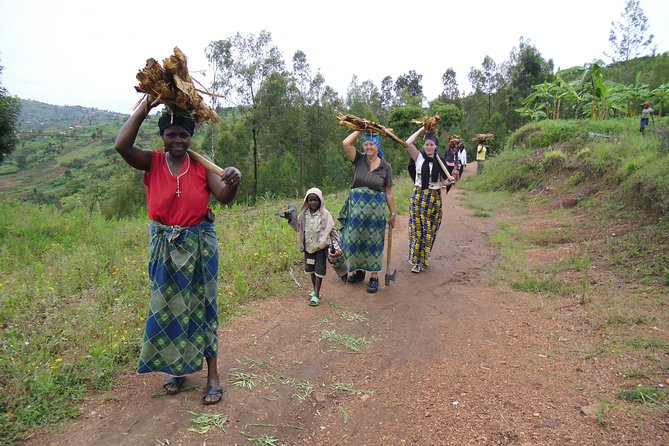
Following the hands-on agricultural work, guests sit down with their host family to enjoy a hearty, home-cooked Rwandan lunch. Utilizing locally-sourced ingredients, the meal features traditional dishes like plantain stew, ugali (cornmeal porridge), and a variety of fresh vegetables and legumes. Throughout the shared dining experience, the host family engages guests in friendly conversation, providing insights into their daily lives and Rwandan culture.
| Dish | Description |
|---|---|
| Plantain Stew | A savory stew made with plantains, onions, and spices. |
| Ugali | A thick porridge made from cornmeal, a dietary staple. |
| Fresh Vegetables | An assortment of locally-grown greens, beans, and other produce. |
Engaging in Conversation
Throughout the shared meal, guests engage in lively conversation with their host family, exchanging insights into their respective cultures and daily lives. The exchange provides a unique opportunity to learn about the local customs and perspectives of the Rwandan people.
Some key highlights of the engaging discussion include:
-
Learning about the family’s farming practices and the challenges they face due to climate change.
-
Discussing the role of traditional artisanry in preserving Rwandan heritage and supporting the local economy.
-
Comparing and contrasting the educational systems and career paths between your’ home countries and Rwanda.
The open dialogue fosters a deeper cultural understanding and creates meaningful connections between the visitors and their gracious hosts.
Weaving Lesson and Handicrafts
The guests’ immersive cultural experience concludes with a hands-on weaving lesson led by the artisan host, providing an opportunity to learn the intricate techniques behind Rwanda’s vibrant textile traditions. The artisan demonstrates the step-by-step process, from stretching the warp threads to skillfully maneuvering the shuttle to create intricate patterns. Guests then have a chance to try their hand at weaving, guided by the artisan’s expert instruction. The activity culminates in a visit to the artisan’s workshop, where guests can browse and purchase a selection of locally crafted handicrafts, including vibrant baskets, intricate weavings, and unique home decor items.
| Item | Description | Price |
|---|---|---|
| Woven Basket | Handmade from natural fibers, each basket is one-of-a-kind. | $20 |
| Wall Hanging | Vibrant textile featuring traditional Rwandan designs. | $35 |
| Beaded Jewelry | Locally sourced beads crafted into necklaces and bracelets. | $15 |
Inclusions and Pricing
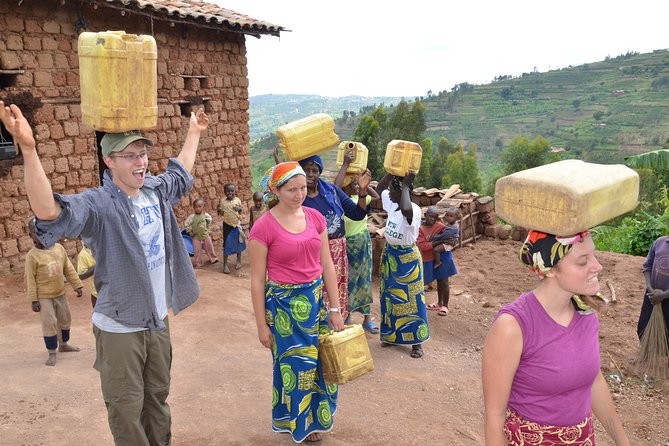
The tour package includes gratuities, bottled water, a local Rwandan lunch, a knowledgeable guide, a tour host, and return transport from Muhanga Town to the village.
Additional charges apply if transportation from Kigali is requested. The price varies based on group size, with a lowest price guarantee. Guests can take advantage of the free cancellation policy up to 24 hours before the experience starts.
The experience offers:
-
Flexible scheduling with start times confirmed directly with the local provider.
-
Operating hours from Monday to Sunday, 8 AM to 11 AM, throughout the year.
-
A minimum of 2 people per booking required.
Meeting and End Points
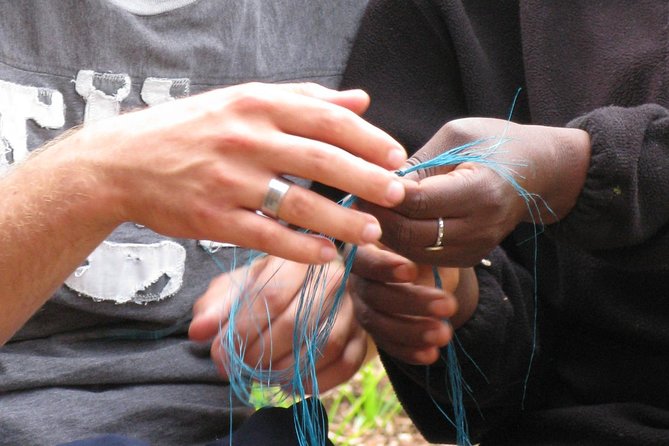
From Kigali, travelers enter Muhanga/Gitarama, pass the prison on the left, and look for the Azizi Life sign after 100 meters to reach the meeting point at NR1, Gitarama, Rwanda.
This is where the day’s experience with the local artisan begins. Once gathered, the group will set out together to the nearby rural village.
At the end of the day, the tour concludes back at the original meeting point. The entire experience is contained within this convenient, centralized location, making it easy for participants to arrive and depart.
With clear directions and a defined start and end point, guests can feel confident in navigating to and from the artisan experience.
Schedule and Accessibility
Confirming the start time with the local provider allows for a flexible schedule, as the experience operates Monday through Sunday from 8:00 AM to 11:00 AM between January 1, 2021 and July 20, 2025.
The tour is family-friendly, with children required to be accompanied by an adult. The experience is also accessible, as it’s wheelchair and stroller-friendly, and service animals are allowed.
The key accessibility features include:
-
Wheelchair accessibility
-
Stroller accessibility
-
Allowance of service animals
This ensures the tour is inclusive and accommodates the needs of a diverse range of guests, enhancing the overall experience.
Frequently Asked Questions
Can Participants Take Part in the Experience Individually?
Yes, participants can take part in the experience individually. The minimum booking requirement is 2 people, but solo travelers are welcome to join the small-group experience limited to 6 guests.
Is There Any Age Limit for the Participants?
There is no age limit for participants, but children must be accompanied by an adult. The experience is family-friendly, welcoming guests of all ages to enjoy the daily life of a local Rwandan family.
What Is the Dress Code for the Experience?
There is no specific dress code for this experience. However, participants are encouraged to wear comfortable, casual clothing suitable for outdoor activities and light physical labor. Closed-toe shoes are recommended for walking in the rural village.
Can Participants Bring Their Own Food and Drinks?
Participants can bring their own food and drinks, but a delicious local lunch is included in the experience. Outside food is allowed, but the hosts provide an authentic Rwandan meal as part of the culture.
Are There Any Additional Costs Beyond the Listed Inclusions?
Beyond the listed inclusions, transportation from Kigali to the meeting point in Muhanga Town is available for an additional charge. There are no other known additional costs for this experience.
The Sum Up
Immersing oneself in the daily rhythms of a local artisan’s life in Rwanda offers a unique cultural experience.
Visitors can witness the artisan’s mastery of traditional weaving techniques, learn about the significance of their craft, and savor authentic Rwandan cuisine.
This interaction fosters meaningful connections, celebrating the artisan’s artistry and the vibrant heritage of their community.
More Tour Reviews in Kigali
Not for you? Here's more things to do in Kigali we have recnetly reviewed
- 2 Best Guided Tours In Kigali
- 9 Best 2 Day Tours In Kigali
- 3 Best 3 Day Tours In Kigali
- 4 Best Lunch Experiences In Kigali
- 3 Best Coffee Tours And Tastings In Kigali
- 2 Best Private Car With Driver Services In Kigali
- Kinunu Guest House
- 2 Days Mountain Gorilla Safari Rwanda
- Akagera National Park
- Private Transfer From Kigali Airport (Kgl) to Kigali
- Kigali City Tour With a Local Guide and Driver
- Discover the Beauty of Rwanda in 12Days
